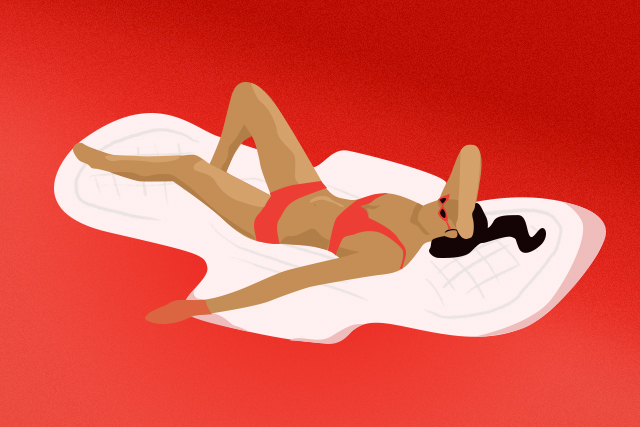
Periods—they’re totally normal, all women go through it, but a lot are still iffy about it. Why? BBC reported it’s difficult for many people because it’s an “embarrassing” topic. This then affects young girls who can’t open up to their parents about “feeling left out,” or simply wanting to know how to deal with stuff like cramps and using sanitary napkins.
This menstruation taboo also extends to men who would rather not talk about it, mostly because they’re uneducated about. As Nannocare noted in a blog, many of them are aware of how periods affect women and their moods. However, they’re unsure of what really goes on down there—apart from their brief knowledge from anatomy class.
Since it was Menstrual Hygiene Day yesterday, we wanted to 1) Debunk all those menstrual myths you may have heard and believed to this day; 2) Continue the discussion and promote the normalization of periods beyond Menstrual Hygiene Day. Because it’s 2019 and we should be helping our fellow women without feeling uncomfortable.
With that, here some myths and misconceptions you might want to reconsider following—for your own good, sis.
Myth: Your acne will lessen when you wash your face with period blood
I’ve heard this beauty tip so many times since I was a kid, it’s not even funny. The superstition states that if you wipe your first period blood during menarche on your face, you’ll grow up acne-free. Although a study had discovered endometrial regenerative cells in period blood, which are “rich with stem cells that reverse ageing, heal injuries, illness, and perhaps even make a blood-tastic facial mask,” this practice is so unsanitary.
Dr. Natasha Esteban of the Philippine General Hospital Adolescent Medicine stated that hormonal acne is normal during menstrual cycles. So there is no guarantee that wiping your period blood on your skin would alleviate that.
Myth: Don’t bathe or wash your hair during your period

I thought this was a Filipino superstition, but apparently, there are people in other countries who believe this too. It’s said that this myth started in Ancient Rome when women would “contaminate” rivers when they bathed. This was during a time when menstruating women were seen as impure. There are still cultures that have this belief, which is why menstruation huts still exist.
In places like Afghanistan, people believe that showering during your period would make you infertile. There’s no scientific evidence for this.
In fact, skipping showers during your period can be bad for you because you’ll be more susceptible to infection. Plus, a warm shower can help soothe cramps too. So don’t deprive yourself of this.
Myth: You’re not allowed to be active

UNICEF listed this as one of the myths told to kids around the world because physical activity can allegedly “disturb the menstrual flow.” There’s no scientific reasoning behind this, but what is proven is that exercise can help cure cramps. According to Healthline, physical activity can also help decrease PMS symptoms and help you feel stronger. Just listen to your body and gauge if you’re able to do exercises from light cardio, to boxing.
But if your cramps get too much and you feel like lying down, you’re perfectly allowed to stay in bed all day!
Myth: When you use a tampon, it takes away your virginity
First of all: Virginity is a social construct created to shame women, implying that they are impure when they have sex before marriage.
Secondly: A “broken hymen” doesn’t necessarily mean a woman already had sex. According to SELF, the hymen can break when you ride a bike, do gymnastics, ride a horse, or insert a tampon—most times you won’t even feel it. Additionally, it’s likened to the appendix: it doesn’t have a known use and women can live without it.
That being said, moms don’t allow their young daughters to use tampons because these will allegedly take away their virginity. Absolutely untrue! Just teach your daughter to follow instructions and insert tampons properly so they won’t feel any pain or discomfort.
Myth: Cloth pads are bad
There are some people who are now opting for more sustainable sanitary products like menstrual cups and cloth pads. Menstrual health researcher Chris Bobel told NPR that there are third-world countries that promote disposable pads because cloth pads can cause infections—mostly brought on by not washing them properly between use.
Chris also admitted these countries may not have accessible clean water and soap, making it difficult to wash cloth pads properly in between use. Still, it doesn’t mean that using cloth pads in general can be bad for your health. It’s really just a matter of keeping them clean and dry before using.
Art by Tricia Guevara
For the latest in culture, fashion, beauty, and celebrities, subscribe to our weekly newsletter here
Follow Preen on Facebook, Instagram, Twitter, YouTube, and Viber
Related stories:
Access to menstrual hygiene products is a basic right, not a luxury
Our office just gave everyone menstrual cups
Ladies, it’s time you start paying attention to your irregular periods
In this country, girls die because of their periods


